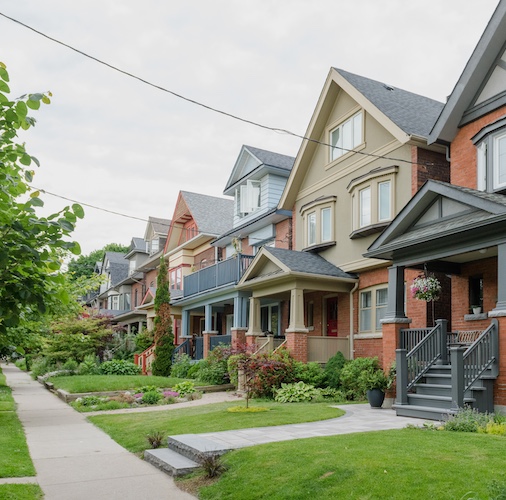Down payment assistance programs and grants: What they are and how they work
Contributed by Tom McLean
Feb 9, 2026
•6-minute read

Saving for a down payment is one of the most significant hurdles to clear for aspiring home buyers. The median sales price for a new home jumped from $298,000 to $392,300 – a leap of $94,300, or 32% – between October 2015 and October 2025. As home prices have risen, so has the amount needed for a down payment. A 5% down payment on a $420,000 home would cost $21,000, and that doesn't include closing costs, which you can expect to range from 3% – 6% of the loan amount.
If you want to buy a home but need help to afford the up-front costs, down payment assistance programs can help first-time buyers become homeowners sooner.
What is down payment assistance?
Down payment assistance programs usually offer eligible buyers loans or grants to help them afford the up-front costs of buying a home. This is usually the down payment, but it may also include closing costs. This assistance can help you bridge the gap if you've been unable to save enough for a down payment.
The minimum down payment you need depends on your loan type and lender. You'll need at least a 3% down payment1 for a conventional loan, and you'll pay private mortgage insurance if you put down less than 20%. insurance. The down payment you need for an FHA loan can be as low as 3.5%, depending on your credit score. VA and USDA loans require no down payment, but lenders may set their own minimum down payment requirements.
Down payment assistance qualifications
While requirements vary by down payment assistance program, typical requirements include:
- You must be a first-time home buyer
- Your income must fall within specified limits
- Minimum credit score of 620
- Your debt-to-income ratio (DTI) can't exceed 50%
- You must occupy the home as your primary residence
- You may have to complete a home buying education course
Who qualifies as a first-time home buyer?
You can qualify as a first-time home buyer, even if you’ve owned a home before. Many down payment assistance programs use the definition set by the U.S. Department of Housing and Urban Development, which defines a first-time home buyer as someone who:
- Hasn’t owned a principal residence in the past 3 years
- Is a single parent who has only owned a home jointly with a spouse
- Is a displaced homemaker who has only owned a home jointly with a spouse
- Does not own any rental or investment properties
How does down payment assistance work?
Down payment assistance can come in several different forms, including:
- Grants
- Forgivable loans
- Deferred payment loans
- Low-interest loans
- Matched savings programs
Down payment assistance programs are run by various government agencies, state housing authorities, and nonprofit organizations. For example, the Department of Housing and Urban Development's Housing Trust Fund allocates up to 10% of its annual funding for down payment assistance, with each state receiving a minimum of $3 million.
Eligibility requirements typically include income limits and credit history checks. You'll need to submit a formal application and may be required to attend a home buyer education course.
Some forms of down payment assistance place a lien on your home to ensure the lender is repaid when you sell, pay off, or refinance your home.
How much assistance can I receive?
The amount of down payment assistance you can get will depend on the program and your financial situation. Some down payment assistance programs provide a percentage of the home purchase price, while others are capped at a specific dollar amount.
For example, California's Dream For All program provides up to 20% of the purchase price, while Florida's Hometown Heroes program offers up to 5% of the first mortgage amount with a $35,000 maximum.
Not all lenders accept all types of down payment assistance. Before applying, verify that your mortgage lender works with the assistance program you're considering.
Types of down payment assistance
Most down payment assistance comes in the form of grants and loans offered at the state and local levels. However, funds are available from the private sector and nonprofit organizations in some places.
Grants
A grant does not have to be paid back. You can use a grant to pay for your down payment or closing costs, depending on the program. Some grant programs will put a lien on your home that remains until you meet specific conditions, typically living in the home for a required period.
Forgivable loans (at 0% interest)
A forgivable loan is a second mortgage that doesn't need to be repaid if you meet specific requirements, like living in the home for a certain amount of time. These loans usually charge no interest and are typically large enough to cover your entire down payment. Lenders forgive the loan after you've lived in your home for the required period, typically 2 – 5 years. If you sell your home before the forgiveness period ends, you'll need to repay the loan.
Deferred-payment loans
Deferred payment loans are second mortgages that charge no interest and do not need to be paid until you sell or refinance the home or pay off your first mortgage. Unlike forgivable loans, deferred-payment loans need to be paid back. A key benefit is that you won’t be burdened with a second mortgage payment each month. You’ll usually repay the loan using proceeds from the sale of your residence. This option works well if you expect to have a higher-paying job by the time you sell or refinance.
Low-interest loans
Low-interest loans let you borrow money for your down payment at a lower interest rate than your full mortgage. This is a second mortgage to help you cover the up-front costs of buying that you’ll repay alongside your primary mortgage. This means you’ll need to make two mortgage payments: one for your primary loan and one for the down payment assistance loan.
While a lower interest rate helps, remember that borrowing for your down payment means you'll pay more for your home over time. You’ll need to make sure you can afford both payments each month.
Matched savings programs
Matched savings programs, also called individual development accounts, connect you with a bank, government agency, or community organization. You deposit funds into an account, and the institution matches your deposits. When you're ready to buy, you can use the total amount toward your down payment.
Ways to find down payment assistance programs
If you’re looking for a down payment assistance program, here are some steps to take:
- Research national programs. HUD maintains a list of local home buying programs by state.
- Research the programs available in your area. Simply searching online for “down payment assistance” with your city’s name can connect you with local programs.
- Ask a mortgage lender. Ask potential lenders if they work with specific down payment assistance programs.
- Use online resources. Websites like DownPaymentResource.com list more than 2,000 homeownership programs, and can help you find local options.
Before moving forward, don't forget to check whether your mortgage lender works with the specific down payment assistance program you're interested in.
How long does it take to get down payment assistance?
It can take several weeks to several months to get down payment assistance, depending on the program, its size, and demand. Each state, city, and organization operates at a different speed, based on available resources and application volume.
Begin researching and applying for down payment assistance programs as soon as you start preparing to buy a home. Starting early helps ensure that your assistance is ready when you find the right home.
Will down payment assistance affect my closing timeline?
Down payment assistance may affect your closing timeline. The assistance program must coordinate with your lender to secure both the loan and the down payment funds. This is why it is recommended that you get the ball rolling on down payment assistance early in the home buying process.
The bottom line: You have options for assistance
Down payment assistance programs help qualified buyers overcome the up-front costs of home buying. Grants, forgivable loans, deferred-payment loans, and other types of assistance help prospective buyers become homeowners.
Even if you don't qualify for assistance now, you may be able to secure a favorable mortgage rate. Start a mortgage application today with Rocket Mortgage to discover your options and take the first step toward homeownership.
Rocket Mortgage is a trademark of Rocket Mortgage, LLC or its affiliates.
1The 3% down payment option is only available on certain conventional loan products and is not available in all states. Additional terms and conditions may apply.

Rory Arnold
Rory Arnold is a Los Angeles-based writer who has contributed to a variety of publications, including Quicken Loans, LowerMyBills, Ranker, Earth.com and JerseyDigs. He has also been quoted in The Atlantic. Rory received his Bachelor of Science in Media, Culture and Communication from New York University.
Related resources
8-minute read
Home buying checklist for first-time home buyers
Starting the process of buying your first home? Use our extensive first-time home buyer checklist to help you prepare and ensure you don't miss a step.
Read more

8-minute read
How to buy a house with no money down
Some mortgages allow you to buy a house with no money down. Learn how to buy a house with n...
Read more

8-minute read
Different types of mortgages and how they work
There is a home loan for everyone, but which type of mortgage is best for you? Use this article to understand the types of home loans and how they work.
Read more